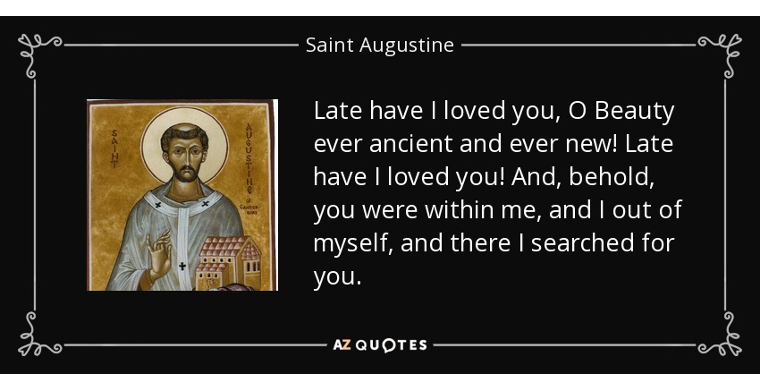LATE HAVE I LOVED YOU - Aurelius Augustine
By the Rev. Roger Salter
Special to Virtueonline
www.virtueonline.org
November 25, 2019
How poignant is St. Augustine's admission; O, how sad the delay of the human heart to discover so late its chief and noblest love! Augustine bewails the catalogue of our former loves that have charmed us before, by grace, we have been captivated by the beauty of the Lord.
When Christ in electing love manifests himself to his chosen, they are ineluctably drawn to himself as a bee is drawn to nectar. The attraction of the Redeemer is irresistible. The coming of those called to him is necessary and certain, and yet the heart of the contrite ones yields to the bidding of Christ willingly just as a sunflower must bend itself toward the celestial origin of light and warmth. There is light and warmth for the alienated sinner in the beckoning of the Lord Jesus. His call is effectual in the manifestation of his loveliness. Gazing delightedly into the face of the Savior, the Son of God and Sun of Righteousness, is our infallible warrant to assurance of salvation. The unbeliever sees no beauty in him:
"He had no beauty or majesty to attract us to him, nothing in his appearance that we should desire him. He was despised and rejected by men, a man of sorrows, and familiar with suffering. Like one from whom men hide their faces he was despised, and we esteemed him not" (Isaiah 53:2b-3). Even if the prophet is not portraying Jesus in a general sense, but rather in his disfigurement as the crucified, natural man does not discern the appeal of the man of sorrows apparent to those whom the Spirit has illuminated with understanding of the atonement for sin he has wrought for us. Indeed, the world hates Jesus. Our attitude towards Jesus Christ is the touchstone of our genuine knowledge of God.
Recipients of divine mercy cannot quarrel with the fact of effectual grace. Would we dare credit 1% of our salvation to the assumed better part of ourselves that distinguishes us from those who fatally spurn him? Was the inclination to grasp Jesus savingly inherent within our otherwise corrupt nature that actually could never prefer holiness? "The mind of sinful man is death, but the mind controlled by the Spirit is life and peace; the sinful mind is hostile to God. It does not submit to God's law, nor can it do so. Those controlled by the sinful nature cannot please God . . . but you received the Spirit of sonship. And by him we cry, 'Abba, Father'. The Spirit himself testifies with our spirit that we are God's children" (Romans 8:6-8, 15b-16). This transition from natural man to child of God is exclusively a divine accomplishment - all of God, all of grace. Augustine endorses this Scriptural sentiment in terms of the sweet love that woos us: "You called and cried out to me and broke open my deafness; you shone forth upon me and you scattered my blindness: You breathed fragrance , and I drew in my breath and I now pant for you: I tasted and I hunger and thirst; you touched me, and I burned for Your peace."
Election and enablement. How sweet the Lord! See our Anglican Confession of Faith - Article 17.
END














